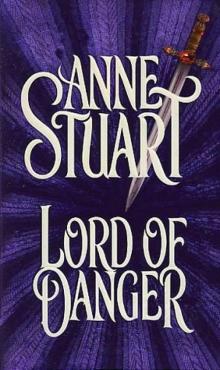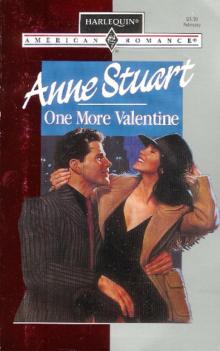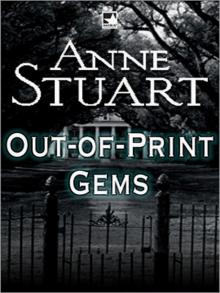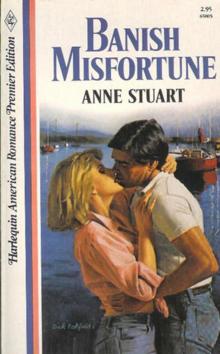- Home
- Anne Stuart
Cold as Ice Page 3
Cold as Ice Read online
Page 3
The only thing rising about her was her temper, but there wasn’t a damn thing she could do about it. She wasn’t getting out of this, she thought. Given that she worked for him, he could expect just about everything he wanted from her. So she gritted her teeth and smiled. “I’m sure I’ll be fine,” she said.
Peter Jensen nodded, his face as impassive as ever. She half expected him to back away like some medieval Chinese servant, but he turned and left, and she watched him go, momentarily fascinated. He looked different from the back—taller, leaner, less generic. Maybe it was the glasses and the slicked-down hair that made him appear so ordinary. Or maybe she was even more in need of a vacation than she had thought, to be having paranoid fantasies about a nondescript personal assistant.
In the end it wasn’t important. She’d been efficiently roped and tied by the charming Texan—she’d let Harry Van Dorn wine and dine her and tomorrow she’d be on her way, able to leave her work and her life behind her. She wasn’t going to sleep with him—she’d decided that a while ago, though she wasn’t sure when. She wasn’t in the mood for anything but escape and quiet.
She would survive the utter hell of falling asleep surrounded by water by taking a couple of tranquilizers to drown out the anxiety. And by this time tomorrow it would all be a distant memory.
Jensen wasn’t happy. Things weren’t going as he’d planned, but then, things seldom did. He hadn’t counted on Genevieve Spenser, or Harry Van Dorn’s taking to her like a puppy with a new squeaky toy. He could turn her to his benefit, as a welcome distraction, but he still didn’t have to like it. Complications were a necessary evil, but he was a man who got rid of complications. He should have arranged to get rid of Miss Spenser before she ever arrived in the islands.
He seldom wasted his time in hindsight. He would have expected a pretty bimbo, a minor inconvenience, one he could dispose of quickly. And she was very pretty, in that sleek, well-cared-for way that tended to set his teeth on edge when he allowed himself the luxury of feeling. But there was more to her than that, though she was trying to hide it. She was smarter than she wanted people to know, and angrier.
That anger was undeniably fascinating. Distracting. The women he knew hid their anger very well, channeling it into more devious endeavors. Genevieve Spenser didn’t seem to have found her outlet, and he could see it simmering beneath her calm brown eyes. Blond hair and brown eyes—an interesting combination. Though her hair was probably some mousy color in its natural state.
And he was thinking far too much about her when he had a job to do. Hans was safely ensconced in the galley, a job he was well trained for, both when it came to food and knives, and Renaud was busy in the bowels of the ship, making sure everything was set to go when they got the word. The other five had been chosen by Isobel Lambert herself, and they were almost as efficient and professional as he was. They’d blended into their new jobs with effortless ease. Harry Van Dorn had no idea he was surrounded by members of the Committee.
Then again, if he was as artless as he seemed to be, he’d have no idea what the Committee was. Few people did, but he didn’t quite believe in Harry’s cluelessness. The kind of power and money he controlled bought a lot of privileged information.
For some reason he was getting impatient.
Harry Van Dorn should have been a simple matter. A megalomaniac billionaire with a taste for the occult and a complicated plan to disrupt the flow of commerce and the financial stability of the world, all to his own benefit.
The problem was, Harry compartmentalized. He had people working on each branch of his plan, each branch of the Rule of Seven was self-contained, and it made discovering the details about each incipient disaster that much more difficult. One never led to another, and his army of minions seemed to have no idea that there were other armies working in concert on parallel disasters. Peter had only been on-site for four months—a relatively short time compared with his last tenure as personal assistant to Marcello Ricetti, a Sicilian arms dealer with a taste for sadism and young boys. Peter had managed to keep him away from the children during the year he’d spent with him, at a price. He’d have had to pay the same price anyway, and he hadn’t thought twice about it. Even though in the end it had cost him his wife.
At least he hadn’t been required to perform more personal services for Harry Van Dorn. Peter’s wellhoned asexual persona was an asset—it was up to the target to make what they wanted of him, and all Harry wanted was someone to see to his every comfort. He could provide for his own sexual needs.
Which brought him around to Genevieve Spenser again. It would probably be better if she slept with Harry. If she were alone in the mate’s cabin it would be harder to keep Renaud from cutting her throat. Though in the end they might have no choice—it would be very dangerous to let her go back to her pampered life in New York and have to answer questions about the disappearance of Harry Van Dorn and his yacht. A casualty of war, Thomason would have said. But Thomason was gone, and Peter had hoped that the ruthlessness that was part and parcel of the Committee could be tempered by restraint.
But people who knew too much were always a problem. The drugs that had been developed were volatile; they could wipe out too much memory or too little. When the stakes were high enough one couldn’t afford to take chances.
But maybe it wouldn’t come to that. Maybe he could get her off the boat after all—she certainly seemed desperate to go. It wouldn’t take long—if Van Dorn’s jet was out of commission she’d have to fly out on a commercial plane, and it would be easy enough to arrange a flight for the crack of dawn, necessitating that she spend the night on the island. She’d seen him, of course, but she wouldn’t remember anything about him. It was one of his many dubious talents.
He was making things needlessly complicated, all for the sake of a spoiled little rich girl. She was here, and she could stay here. He’d deal with the ramifications of that later. He’d keep her alive if he could. If not, he’d make certain it was swift and merciful. After all, being born into privilege was no great crime. Only a moral misdemeanor.
The mate’s cabin was an expansive suite that belonged more in a five-star hotel than on a boat. The king-size bed took up only a quarter of the room, and a picture window overlooked the gently rocking ocean. Genevieve pulled the curtains.
She took a lengthy shower, simply for the novelty of it, pampering herself. She’d finally gotten used to those little elegances—a childhood of scrimping, of making sure appearances were kept up, had done a complete turnaround, to such a well-kept extreme that it sometimes amused her. Who would have thought the well-bred, desperately poor little Genny Spenser would end up so pampered? There’d been a certain cachet in being one of the nouveau pauvre. The money her robber baron ancestors had amassed was long gone, and all that was left was the expectation of privilege without the money to buy it. Not that her parents would admit to that. In public they were still the Spensers, socially above those who actually had to work for a living. Inside the house with the leaking roof, the closed-off wings, the weed-choked driveway and the empty rooms, they ate boxed macaroni and cheese resentfully prepared by her mother.
They were lucky they had a roof over their heads. Her black-sheep father was the only Spenser left in their branch of the family, but upon his death the house was already in trust to the state of Rhode Island. So he’d simply sold anything he could—all the surrounding land, every piece of furniture worth something. The art had already been divested in a previous generation, and her grandmother had survived by selling off her jewelry. There was very little left to sell by the time Genevieve’s parents moved in.
No one was allowed to visit, of course, because then the secret would be out. They were always in the midst of massive renovations, her parents would say, and returned social commitments at a restaurant or club. And Genny and her sister would eat butter-and-potato-chip sandwiches for weeks to pay for it.
Now she could buy anything, eat anything, wear anything she wanted. It was
no wonder she had those wretched fifteen pounds—there were just too many lovely things to partake of. If her ruthlessly slim mother had been alive she would have been horrified.
But her parents were dead, the house was gone, and Genevieve Spenser earned a fortune at the hands of Roper, Hyde, Camui and Fredericks. She belonged with a man like Harry Van Dorn, her mother would have said, though she would have wrinkled her nose at his politically correct factories. The only acceptable way to have money was to inherit it, according to her mother. Her father would simply have had another scotch.
The shower was huge, somehow managing to be both tasteful and ostentatious, and she let the water pound some of the tension from her body. She’d take another tranquilizer before she joined Harry again, though she’d have to watch her intake of wine. And she’d sleep alone in that luxurious bed, doubtless beneath Egyptian-cotton sheets with an astronomical thread count, and tomorrow night she’d be in a sleeping bag on the ground. And she’d be a hell of a lot happier.
It was getting dark when she came out of the shower, and she could see lights from the shoreline through the filmy curtains. She wasn’t sure they were a reassurance that land was nearby or a reminder that she wasn’t on it, but she left the curtains closed anyway as she dressed in the new clothes, pulling off the tags that had been left on. Size eights. She didn’t know whether to be annoyed or relieved.
She reached for her bottle of pills, and at the last minute popped two in her mouth. It had to be the ocean water that was making her paranoid, uneasy, convinced that something, somehow, was wrong. But the pills would take care of that, and after tomorrow she could throw them away. Or at least pack them until she had to return to the city and the way of life she’d chosen.
She sank down in one of the oversize chairs, closing her eyes as she waited for the Zenlike calm to envelope her. It would all be all right. It would be lovely. And then she’d be gone.
She was a pretty little thing, Harry Van Dorn thought, watching her on the closed-circuit television in his stateroom. A little too padded for her clothes, but stripped she was just right. He’d gotten tired of bone-thin models who performed tirelessly.
But then, that was normal for him. He was a creature of impulse, and he had a short attention span. He became obsessed with something, overindulged, and then lost interest. He’d gone through virgins, older women, ugly women and handsome men. He’d stayed longest with the children, but they tended to cry too much, and even when he found a good one they had an unfortunate tendency to age, and he’d never cared for anyone over eleven.
His taste for models had been a fortunate alternative—it was socially acceptable, even encouraged, and he had no trouble attracting them. He was just as much a trophy as they were, and the relationships were mutually beneficial.
The only problem was he couldn’t hurt them without paying a huge price. Their bodies were their livelihood, and any kind of scarring, any broken bones or bruising would diminish their value. He’d gone a bit overboard with one, and then had to try to buy her off. She’d made the very grave mistake of refusing, and no one had thought it the slightest bit strange that an anorexic supermodel had been found starved to death in a little French château.
But that was in the past. He looked at Genevieve Spenser’s creamy, beautiful skin and knew he was going to have her. His lawyers knew how to quiet things up, and if he made a mistake, went a bit too far, his ass would be covered. No, Ms. Genevieve Spenser was a downright thoughtful gift from the universe, as well as those contracts she’d brought with her. The ones that severed his connections to some of his most lucrative oil fields. The ones that were going to be blown up in just about two weeks’ time.
The Rule of Seven, his lucky number. Seven disasters to throw the financial world into an uproar, the kind of uproar a smart man could benefit from. And he considered himself a smart man. The decimation of the oil fields was number three, and nothing would stop it. Nothing would stop him.
Until he had everything he wanted.
And the nice thing about that was, he always wanted more.
3
Of course it had to be tonight, Peter thought savagely, closing the communication device that was so visionary it didn’t even have a name. Word had come down from Madame Lambert—the time for waiting was past, and tonight was the night. There was no wiggle room; at midnight, when the harbor patrol changed, they were taking over Harry’s Seven Sins and disappearing. The course had been plotted long ago, and the men in the wheelhouse were some of the best. No one would be able to find them, even with the most advanced surveillance systems.
Then again, no one would be looking for them. Harry Van Dorn was known to take off when the mood struck him, and the time he spent aboard the Seven Sins usually involved the world’s idea of romance. If he disappeared, it would first be assumed he had some sort of assignation, probably at his private island. And Peter Jensen had been on-site long enough to know how to steer nosy people in the wrong direction.
Harry did have an assignation on Little Fox Island, all right. But it wasn’t with a leggy model. He had an appointment with death, and the longer Jensen was around him the more he knew it was long overdue.
But why the hell did Madame Lambert have to pick tonight? When a relative innocent had strayed into their path? He was used to dealing with anomalies, but his choices had never been quite so clear cut. He had to get her off the boat. Or she had to die.
And he had only a few hours to make that happen.
Questioning orders was frowned upon by the Committee, and Peter didn’t even consider it. He did his job with single-minded determination and ignored the larger ramifications. He didn’t want to be the one making the life-or-death decisions. If he had to make them, he might have trouble carrying them out, and the world couldn’t afford that.
Saving the world, one murder at a time, Peter thought, putting his wire-rimmed glasses back on his face. The funny thing was, he really didn’t want to kill Harry Van Dorn. For the simple reason that he was afraid he might enjoy it, and then he’d really be lost.
It was going to be an antiseptic, long-distance hit, and he’d let Renaud do the honors. Renaud had no qualms about his work; he reveled in it a bit too much, which could always be a liability. Peter’s icy control was money in the bank—the job got done with deadly efficiency and no fuckups.
There’d be no fuckups on this one either. But he had to get rid of Genevieve Spenser. Now.
She’d miscalculated. Genevieve sat in one of the elegant lounges on Harry Van Dorn’s megayacht, forcing herself to eat sparingly of the food that was far too good for a pick-up chef, and drank too much wine. She should have paid attention, but even by her recently pampered standards the wine was extraordinary, and it would have been a crime to ignore it. She knew herself well enough to know when she’d had enough, but it was too late at that point, and her only choice was to manage a dignified retreat.
It hadn’t been a bad evening—Harry was charming, full of flattering attention and entertaining stories that poked fun at both himself and the high and mighty. At some other time Genevieve might have felt like reciprocating that flattery—he was movie-star handsome, and she hadn’t been involved with anyone in longer than she wanted to remember. The firm would approve, and she could have a night of pleasure to send her on her way to the rain forest.
The problem, of course, was that it wouldn’t be particularly pleasurable. The first time she slept with a man it tended to be uncomfortable, nerve-racking, even unpleasant. Even with the wine and the tranquilizers she would only manage to relax enough to do it but not enjoy it. No, Harry Van Dorn was flirting heavily, but he didn’t seem likely to push it, and she was just as happy to be able to keep a relative distance.
“I’ve got a busy day tomorrow,” she said, rising on thankfully steady feet. “I’ve had a lovely evening, but I’m afraid I’m going to have to say good-night.”
Harry rose, towering over her, his big Texas grin almost tempting. “Are you sure
I can’t talk you into an after-dinner liqueur? Maybe view my etchings?”
She laughed, as she was supposed to. “I think I’ll take a rain check on the etchings,” she said. “I’m so exhausted I’ll probably fall asleep on my feet.”
“We can’t have that. I suppose I’d better call Jensen!”
The ghost appeared, seemingly out of the woodwork, and his sudden presence momentarily cleared the fog in Genevieve’s brain. “Shall I see Ms. Spenser to her quarters, sir?”
Harry didn’t look pleased at Jensen’s rapid appearance.
“I can find my own way,” she protested, just as the boat shifted beneath her, and she had to reach out and catch the back of the banquette.
“The wind has picked up a bit, and we wouldn’t want you to slip or get lost. The SS Seven Sins is a big ship. Besides, Jensen’s here to serve, aren’t you?”
“Yes, sir,” he murmured, his voice as colorless as his eyes.
She almost changed her mind. Stupid, of course, she chided herself, but for a brief, wine-fogged moment she felt safer with Harry Van Dorn and his straightforward attempts at seduction than the almost invisible servant with the empty eyes.
But she hadn’t had that much to drink. She put her best smile on her face. “If you wouldn’t mind, Mr. Jensen?”
“It’s his job, Genevieve,” Harry drawled.
She glanced up at Jensen’s impassive face. She really needed this vacation—she had no reason at all to feel so uneasy in his presence. Maybe the pills she took to calm her down had backfired, making her more paranoid.
None of it mattered. She’d be gone by tomorrow, and she wouldn’t have to be anyone but herself.

 Ice Blue
Ice Blue Seen and Not Heard
Seen and Not Heard Never Marry a Viscount
Never Marry a Viscount Heartless
Heartless The Devil's Waltz
The Devil's Waltz Hidden Honor
Hidden Honor Silver Falls
Silver Falls Fire and Ice
Fire and Ice Nightfall
Nightfall Never Trust a Pirate
Never Trust a Pirate The Soldier and the Baby
The Soldier and the Baby Still Lake
Still Lake Reckless
Reckless The Spinster and the Rake
The Spinster and the Rake Winter's Edge
Winter's Edge At the Edge of the Sun
At the Edge of the Sun Into the Fire
Into the Fire Night of the Phantom
Night of the Phantom Ritual Sins
Ritual Sins Darkness Before the Dawn
Darkness Before the Dawn Against the Wind
Against the Wind Ruthless
Ruthless The Catspaw Collection
The Catspaw Collection Escape Out of Darkness
Escape Out of Darkness The Widow
The Widow Shameless
Shameless Black Ice
Black Ice Breathless
Breathless Shadows at Sunset
Shadows at Sunset Falling Angel
Falling Angel Housebound
Housebound Cold as Ice
Cold as Ice The Wicked House of Rohan
The Wicked House of Rohan Lord of Danger
Lord of Danger The High Sheriff of Huntingdon
The High Sheriff of Huntingdon Wildfire
Wildfire Moonrise
Moonrise The Demon Count's Daughter
The Demon Count's Daughter Date With a Devil
Date With a Devil To Love a Dark Lord
To Love a Dark Lord Driven by Fire
Driven by Fire Special Gifts
Special Gifts Ice Storm
Ice Storm Shadow Lover
Shadow Lover A Dark & Stormy Night
A Dark & Stormy Night Now You See Him...
Now You See Him... Lady Fortune
Lady Fortune Glass Houses
Glass Houses A Rose at Midnight
A Rose at Midnight Prince of Swords
Prince of Swords One More Valentine
One More Valentine Return to Christmas
Return to Christmas Tangled Lies
Tangled Lies Consumed by Fire
Consumed by Fire The Fall of Maggie Brown
The Fall of Maggie Brown Wild Thing
Wild Thing Crazy Like a Fox
Crazy Like a Fox The Demon Count
The Demon Count Prince of Magic
Prince of Magic Wildfire (The Fire Series Book 3)
Wildfire (The Fire Series Book 3) Anne Stuart's Out-of-Print Gems
Anne Stuart's Out-of-Print Gems Shadow Dance
Shadow Dance Under an Enchantment: A Novella
Under an Enchantment: A Novella Demonwood
Demonwood Blue Sage (Anne Stuart's Greatest Hits Book 3)
Blue Sage (Anne Stuart's Greatest Hits Book 3) Barrett's Hill
Barrett's Hill Angel's Wings (Anne Stuart's Bad Boys Book 5)
Angel's Wings (Anne Stuart's Bad Boys Book 5) Darkness Before Dawn
Darkness Before Dawn The Right Man
The Right Man The Houseparty
The Houseparty Reckless_Mills & Boon Historical
Reckless_Mills & Boon Historical Banish Misfortune
Banish Misfortune Angel's Wings
Angel's Wings Chain of Love
Chain of Love Consumed by Fire (The Fire Series)
Consumed by Fire (The Fire Series) Partners in Crime (Anne Stuart's Bad Boys Book 4)
Partners in Crime (Anne Stuart's Bad Boys Book 4) The Soldier, The Nun and The Baby (Anne Stuart's Greatest Hits Book 2)
The Soldier, The Nun and The Baby (Anne Stuart's Greatest Hits Book 2)